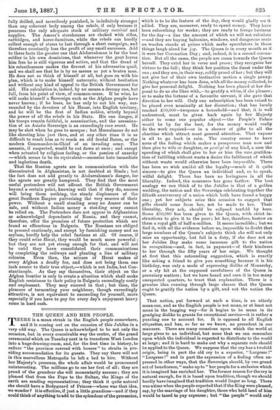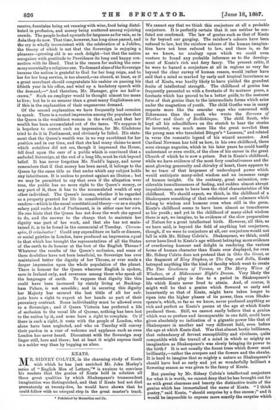THE QUEEN AND HER PEOPLE.
giaERE is a mean streak in the English people somewhere, A- and it is coming out on the occasion of this Jubilee in a very odd way. The Queen is acknowledged to be not only the occasion, but in every conceivable way the centre, of the grand ceremonial which on Tuesday next is to transform West London into a huge drawing-room, and, for the first time in history, to reduce "the province covered with houses" to straits in pro- viding accommodation for its guests. They say there will not in this marvellous Metropolis be left a bed to hire. Without her Majesty's presence, the whole affair would be pronounced uninteresting. The millions go to see her first of all; they are proud of the grandeur she will momentarily assume ; they are pleased that from the Pope to the Sultan, the Kings of the earth are sending representatives; they think it quite natural she should have a Bodyguard of Princes—whose was that idea, we wonder P itis effective, if jest a little grandiose—and if they could think of anything to add to the splendour of the procession, which is to be the feature of the day, they would gladly see it added. They are, moreover, ready to spend money. They have been subscribing for weeks ; they are ready to forego business for the day—a fine the amount of which we will not calculate —and they are buying balconies, windows, and dangerous seats on wooden stands at prices which make speculators in those things laugh aloud for joy. The Queen is in every mouth as if it were her Coronation Day ; and, indeed, it is a second corona- tion. But all the same, the people are mean towards the Queen herself. They extol her in verse and prose; they recognise her virtues to the full ; they think her position the finest under the sun; and they are, in their way, coldly proud of her ; but they will not give her of their own instinctive motion a single penny. Nothing whatever has been done, with all the money collected, to give her personal delight. Nothing has been placed at her dis- posal to do as she likes with,—to gratify a whim, if she pleases ; or to make the fortune of a favourite servant, if she gave that direction to her will. Only one subscription has been raised to be placed even nominally at her discretion ; that has barely reached 250,000—twopence a household—and that, it is well understood, must be given back again by her Majesty either to some one popular object —the People's Palace would be by far the best, for the money would really do the work required—or in a shower of gifts to all the charities which attract most general attention. That vapour is all to go back in rain. The country seems to have none of the feeling which makes a prosperous man now and then give to wife or daughter, or protégé of any kind, a sum the spending of which shall give to her or him the rare gratifica- tion of fulfilling without waste a desire the fulfilment of which without waste would otherwise have been impossible. There has been no wish amidst all the loyalty—much of it quite sincere—to give the Queen an individual and, so to speak, wilful delight. There has been no lovingness in all the liberality. Indeed, the meanness has gone farther. The best analogy we can think of to the Jubilee is that of a golden wedding, the nation and the Sovereign celebrating together the fiftieth anniversary of a union which both have found a happy one ; yet her subjects seize this occasion to suggest that gifts should come from her, not be made to her. Their liberality, they ask, should be eclipsed tenfold by hers. Some 250,000 has been given to the Queen, with strict in- structions to give it to the poor ; let her, therefore, bestow on them a royal gift of half-a-million. It seems incredible ; but we find it, with all the evidence before us, impossible to doubt that large numbers of the Queen's subjects think she will not only miss an opportunity, but fail in a duty, if she does not on her Jubilee Day make some immense gift to the nation in recognition—and, in fact, in payment— of their kindness to her through the fifty years of her reign. We thought at first that this astounding suggestion, which is exactly like asking a friend to give you something because it is his birthday, was only a mode of expressing dislike of Monarchy, or a sly hit at the supposed carefulness of the Queen in pecuniary matters ; but we have heard and seen it in too many unexpected quarters, to trust that explanation. There is a genuine idea running through large classes that the Queen ought to gratify the nation by a gift, and not the nation the Queen.
That notion, put forward at such a time, is an utterly mean one, and as the English people is not mean, or at least not mean in the begging way—for it begins to be mean in its grudging dislike to grants for exceptional service—it is rather a puzzling one to account for. It is opposed to all English etiquettes, and has, so far as we know, no precedent in our manners. There are many occasions upon which the world at large gives to an individual, but none that we can remember upon which the individual is expected to distribute to the world at large; and it is hard to make out why a separate rule should be applied to the Queen. We suppose that the cry has a twofold origin, being in part the old cry to a superior, "Largesse !" "Largesse I" and in part the expression of a feeling often ex- pressed in other ways, that the Sovereign should, by one grand act of beneficence," make up to" her people for a seclusion which it is imagined has enriched her. The former reason for the cry is natural enough, for it is based upon tradition, though we should hardly have imagined that tradition would linger so long. There was atime when the people expected that if the King were pleased, say, by the marriage of his daughter, those who held land of him would be taxed to pay expenses; but "the people" would only
receive, fountains being set running with wine, food being distri- buted in profusion, and money being scattered among rejoicing crowds. The people looked upwards for argesses as for rain, as in Asia they do now. That time, however, has long since passed, and the cry is wholly inconsistent with the celebration of a Jubilee, the theory of which is not that the Sovereign is enjoying a pleasure—growing old is no such delight—but that the nation recognises with gratitude to Providence its long and happy con- nection with its Head. That is the reason for making the cere- mony essentially a religious one. To demand alms of the Sovereign because the nation is grateful to God for her long reign, and to her for her long service, is too absurd,—as absurd, at least, as if a great merchant should congratulate his cashier on passing his fiftieth year in his office, and wind up a laudatory speech with the demand,—" And therefore, Mr. Manager, give me half-a- crown." Such an employer would be thought almost too mean to live; but he is no meaner than a great many Englishmen are, if this is the explanation of their ungenerous demand.
Of the second explanation we have frequently had occasion to speak. There is a rooted impression among the populace that the Queen is the wealthiest woman in the world, and that her wealth has been accumulated out of the taxes. We suppose it is hopeless to correct such an impression, for Mr. Gladstone tried to do it in Parliament, and obviously he failed. His state- ment that the Queen's wealth was in no way exorbitant for her position and in our time, and that she had many claims to meet which outsiders did not see, though it impressed the House, fell dead upon the ears of a public which is convinced that a secluded Sovereign, at the end of a long life, must be rich beyond belief. It has never forgotten Mr. Neeld's legacy, and never remembers that if that money has been saved, it belongs to the Queen by the same title as that under which any subject holds any inheritance. It is useless to protest against an illusion ; but we may be permitted to say that even if the allegation were true, the public has no more right to the Queen's money, or any part of it, than it has to the accumulated wealth of any other individual. The Queen's income, whether it be regarded as a property granted for life in consideration of certain sur- renders—which is the usual constitutional theory—or as a simple salary paid under Act of Parliament, is in either case her own. No one hints that the Queen has not done the work she agreed to do, and the answer to the charge that to maintain her dignity was part of her work, and that she has not main- tained it, is to be found in the ceremonial of Tuesday. Circum- spice, 0 crirainator ! Could any expenditure on balls or dinners, or social gaieties in London, have produced an impression equal to that which has brought the representatives of all the States of the earth to do honour at the foot of the English Throne ? Whatever the results of the Queen's seclusion, and some of them doubtless have not been beneficial, no Sovereign has ever maintained better the dignity of her Throne, or ever made a deeper impression upon the whole population of the planet. There is honour for the Queen wherever English is spoken, save in Ireland only, and reverence among those who speak all the languages of earth. To suppose that dignity like this could have been increased by stately living at Bucking- ham Palace, is not sensible; and in securing this dignity her Majesty has secured the last tittle of all her sub- jects have a right to expect at her hands as part of their pecuniary contract. Some individuality must be allowed even to a Sovereign ; and if Queen Victoria has preferred a life of seclusion to the usual life of Queens, nothing has been lost to the nation by it, and none have a right to complain. Or if there is such a right, it rests with the people of London, who alone have been neglected, and who on Tuesday will convey their pardon in a roar of welcome and applause such as even London has never heard. Discontent with the Sovereign may linger atilt, here and there; but at least it might express itself in a nobler way than by begging an alms.



































 Previous page
Previous page